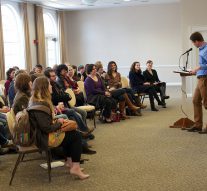
Tables Turned: How Professors Learn
SPC Programs & Events January 24, 2017By Antonia Lewandowski, Ed.D.
My hands sweating, I held onto the packet of manuscripts on my lap. On this January morning, my first day of class at a writers’ conference, I looked around at the other eleven people in my workshop and began to match story titles to name tags.
“Oh,” a tall young man my right said, “you’re Antonia! I liked your story.”
“Well, thanks. And you are . . .?” I read the nametag and realized that his story about childhood abuse was the last piece I’d read and it left me with a chill.
So what was I doing here, I thought. With my many years of teaching and published work, what did I need to learn now? A lot, I found out. Teaching Composition I and II puts me in touch with writers who want to develop academic and professional skills. I know how to help these writers. At the same time, as we read nonfiction and literature in the service of good writing, the idea of doing what I teach came up as a new challenge. So a few semesters ago, I signed up as a participant in Professor Sheree Greer’s creative writing class. That’s when I wrote my first short story. It wasn’t very good. What’s next, I thought?
With a faculty development grant from SPCollege in 2012, I attended my first writers’ conference. With other writers, both published and upcoming, and led by nationally recognized novelist, Stewart O’Nan, we went straight into peer review of our stories. That’s when everything clicked for me.
Just as in Comp I class, we discussed, questioned, suggested how our stories might change, what to keep, what to shave away, and how to let go of those ideas that we think are terrific, but actually distract the reader. Everything familiar from Comp class, but at a higher level. And that’s what writing is, a process between what the author needs to say and what the reader wants to know.
After a three-hour morning class, we had afternoon lectures on craft and evenings where noted authors read from their work.
The seven-day conference also strengthened my belief in coaching writers, not only skillfully, but more importantly, with empathy. Everyone looks at a blank screen for a while. Everyone turns in drafts that they’ve labored on, only to find out there’s more work to do. I returned to my classes with a sharper understanding of my students’ anxiety and gained more tools for defusing its power.
So that’s what professors do at conferences. We make presentations, we read papers to skeptical audiences, we network with our peers, and we come back to you students with new ideas that infuse our teaching practice.
(Dr. Lewandowski has published poetry, educational articles, and flash fiction. She is currently working on a collection of short stories. Awarded a full scholarship to the 13th Annual Writers’ Conference at Eckerd College, she will attend from January 14-21st, 2017)





